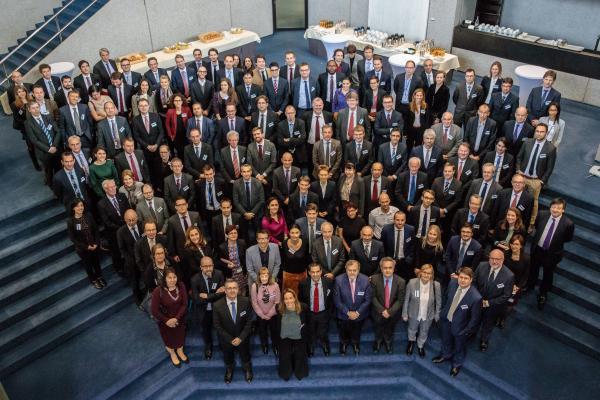
- EIB Investment Report 2017/2018 shows that companies are held back by lack of skilled workforce and regulation more than by financing problems.
- Corporate investment reaches pre-crisis levels, but firms consider only half of their capital stock to be state-of-the-art.
- Municipalities report significant investment gap, especially in transport, ICT and social housing.
The investment recovery in Europe continues to strengthen and become more broad-based across countries and sectors. The rate of corporate investment has recovered to pre-crisis levels. But companies as well as municipalities consider their investment in recent years to have been insufficient. Investment gaps in infrastructure and innovation threaten to undermine the long-term competitiveness of the European economy. The government investment rate is at its lowest level for 20 years.
These are the main findings of EIB Investment Report 2017/2018, presented by the European Investment Bank (EIB) at its Annual Economic Conference in Luxembourg on November 23. The report incorporates the results of the annual EIB Investment Survey (EIBIS) of 12,500 businesses in the EU, which this year also includes a Europe-wide survey of 600 municipal authorities.
EIB President Werner Hoyer commented on the results: “We may no longer need to stimulate investment for purely counter-cyclical reasons but we do need to address the backlogs in investment that have built up during the crisis to address long-term structural needs. And most importantly we need to channel investment to those areas that will increase Europe’s long-term potential growth. In this both public and private investment has a vital role to play.”
The EIB Investment Report reveals an urgent need to accelerate investment in research and development and other “intangibles” vital to innovation such as software, training, and organisational capacity. It shows that “lack of staff with the right skills” is now the most frequently cited deterrent to investment, mentioned by 72% of firms. It is followed by general “uncertainty about the future”, and business, tax and labour market regulations. Firms call for public investment in professional training and higher education as a first priority, closely followed by investment in transport and digital infrastructure. While access to finance improved and is now a concern for only a share of firms throughout Europe, young and innovative firms remain at a disadvantage.
Municipalities see the same needs, the EIBIS survey shows. A third of them report that investment over the last five years has been below needs. Most affected sectors are urban transport, ICT and social housing. Local governments cite fiscal constraints as the main obstacle, not so much access to finance. But the EIBIS also shows a need for better planning and prioritisation of infrastructure investment, as well as stronger technical capabilities.
EIB Vice President Andrew McDowell commented: “The EIB Investment Report points to significant investment gaps in Europe, but also to the need for structural reforms. It is not only important to invest more, but also to invest wisely and to create the right conditions for investment to take place. Market inefficiencies not only directly influence firms’ investment decisions; they also indirectly weaken the ability of the economy to quickly adapt to technological change”.
While Europe remains a leader in climate action investment, more has to be done. Investment in climate change mitigation has declined by EUR 45 billion in the last five years, from 1.6% of EU GDP in 2012 to just 1.2% in 2016. While Europe is expected to meet its own targets for 2020, more investment is needed to reach the 2030 targets and beyond.
“We have a window of opportunity to address structural investment needs through both public and private investment”, Debora Revoltella, Director of the EIB Economic Department, said. “There is a need to re-prioritise public infrastructure investment, supported by better planning and prioritisation. At the same time, we need to pay more attention to innovation, including investment in intangible capital, particularly skills. We need to promote a more diversified mix of business finance to foster innovation and also support financial stability. Although financing conditions have improved, we still see greater constraints for young, small and more innovative firms.”
http://www.eib.org/attachments/efs/economic_investment_report_2017_key_findings_en.pdf
http://www.eib.org/attachments/efs/eibis_2017_european_union_en.pdf

Photographer: Mireia Gonzalez Torrijos ©EIB
Download original

Photographer: Mireia Gonzalez Torrijos ©EIB
Download original

Photographer: Mireia Gonzalez Torrijos ©EIB
Download original

Photographer: Mireia Gonzalez Torrijos ©EIB
Download original

Photographer: Mireia Gonzalez Torrijos ©EIB
Download original